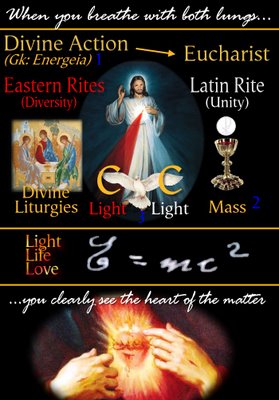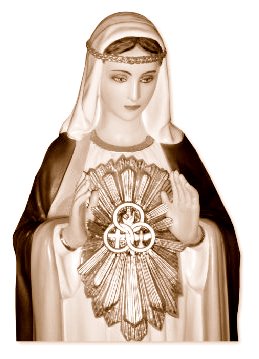Salt, Light, Leaven...Those three hallowed words
We Catholics must seek to understand Pope Benedict's heart—
what he stands for—so that we might become instruments
of the Holy Spirit in the New Evangelization
From ZENIT:
Code: ZE06062527
Date: 2006-06-25
Cardinal Martino's Address in Singapore on the Laity
Social Doctrine and Human Promotion
SINGAPORE, JUNE 25, 2006 (Zenit.org).- Here is the address that Cardinal Renato Martino, president of the pontifical councils for Justice and Peace and for Migrants and Travelers, gave June 20 in Singapore on the laity....
The lay faithful, if they are to be salt, light and leaven in the world, must work to make ever more evident those things that are authentically human in social relations, without fear and with openness to and hopefulness for the future.
...
There is always a need for witnesses, for martyrs and saints, also in the area of society.
...
The Christian vision of the person is distinguished by the absolute character recognized in the person deriving from the fact of men and women being the "imago Dei": This means that the human person cannot be reduced to something else, or be considered a means and not an end, or be understood in a partial and reductive sense.
Code: ZE06062501
Date: 2006-06-25
8 Keys to Reading Joseph Ratzinger's Work
Suggested by Archbishop Forte
The archbishop, a member of the International Theological Commission, presented his ideas at the closing the first course of Specialization in Religious Information, organized by the University of the Holy Cross.
The prelate began his address June 17 by presenting, as the first key, an analysis of the historical and cultural context in which the theological work matured of the man who today is Benedict XVI.
After 1968, when the "age of utopia" and its vision of an essentially "useless" God came to the fore, Ratzinger's work began to develop its anti-ideological conviction, said Archbishop Forte, 56. (((False Enlightenment based on the false premise of free love)))
Moreover, after 1989, when the "age of disenchantment" and the idea of the "death" of God prevailed, Ratzinger's challenge was to "propose horizons of meaning, joy and hope," the Italian archbishop said. (((False Humanism based on the false premise that God can be excluded)))
During this period, Joseph Ratzinger elaborated the concept of "Deus caritas," which shows that the topic of his first encyclical was "long in maturing," observed Archbishop Forte. (((God is Light, Life and Love)))
The second key is the task Joseph Ratzinger assumed with his theology: "to give witness with the service of the intelligence to the Word amid the words of men," that is, "a 'diakonia' [service] to truth in the house of truth," namely, the Church. (((Seek the Light of Truth in service)))
In fact, "God is not found in solitude" but in a "community that remembers and narrates and which, at the same time, interprets the truth that has been transmitted to us," said Archbishop Forte. (((Trinity and Unity—covenant communion)))
Abandoning ourselves
The third key is the meaning of believing. Quoting Ratzinger himself, in his "Introduction to Christianity," Archbishop Forte said that to believe "means to give one's assent to that sense that we are not capable of building ourselves, but only to receive it as a gift, so that it is enough to accept him and abandon ourselves to him." (((See all things as GIFT...God's presents (presence)))
Illustrating the fourth key to the reading, the archbishop said that the God in whom one believes, can only be a personal god, God the Father, who is revealed in biblical history as the living God, that is, the God of Jesus Christ. An unknown God cannot be loved. Only a personal one can be loved, one who addresses us and who, at the same time, we can address. (((Seek God's Presence and Stay in his Light)))
In this context, the relationship between man and God must be characterized by the move from "dualism," which has opposed the human and the divine, faith and reason, in many periods of the modern spirit, to "meeting" and correspondence. (((From EITHER/OR to BOTH/AND)))
According to the fifth key of Ratzinger's thought, "the human and divine meet but are not confused in Jesus Christ," noted the prelate. God is not the answer to man's expectation, but is always superior; "he is the beyond who overtakes, disconcerts and troubles us." (((A simple childlike faith seeking understanding)))
The sixth key is the vision of the Church as the place where God dwells. "The Church must always live in docility to the Spirit and must be ready to acknowledge resistances to the Spirit," Archbishop Forte observed, indicating the importance of admitting faults of the past. (((Open to "Light-based "movements of the Spirit))
Eschatology
The seventh key, the vision of the beyond, eschatology, is a "dominant theme in Ratzinger's thought" and affects first of all the identity of the Christian: "a prisoner of the future of God," who must measure his decisions on the horizon of the infinite God, according to the archbishop. (((Future, Present, Past---Father, Son, Holy Spirit...ponder it)))
In this connection, "the Christian lives in an anticipated and anticipating experience of the last things," through faith and the sacraments, but is also "critical reserve" because at times the Christian goes against the current. (((Eucharist—"critical Mass" the source of life and love in the Church)))
The last stage illustrated by Archbishop Forte was the image that summarizes this theological work -- Mary -- synthesis of ecclesiology: "a concrete and personal icon in which the coordinates of Christian thought are expressed." (((Mary—pure, reflected light)))
The archbishop concluded his address highlighting the differences between Pope John Paul II and Benedict XVI. If Pope Karol Wojtyla was a personalist anthropologist, he said, then Pope Joseph Ratzinger is a theologian who is "almost a catechist," bearer of the possibility of the meeting of different traditions and cultures.
Become like Jesus
Live for the Triune God
See you on the High Ground!





























No comments:
Post a Comment